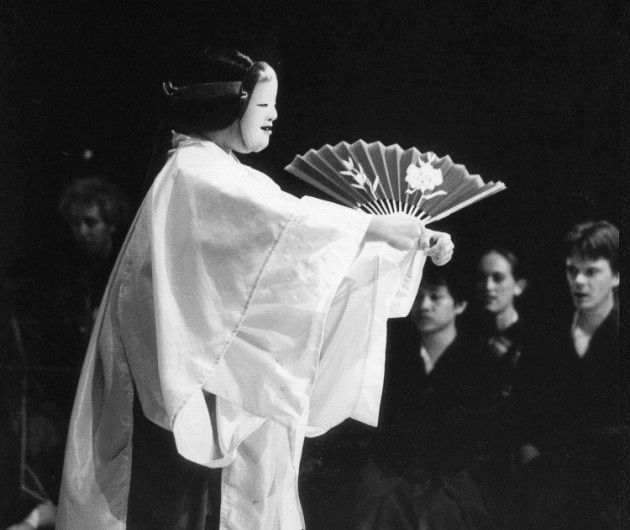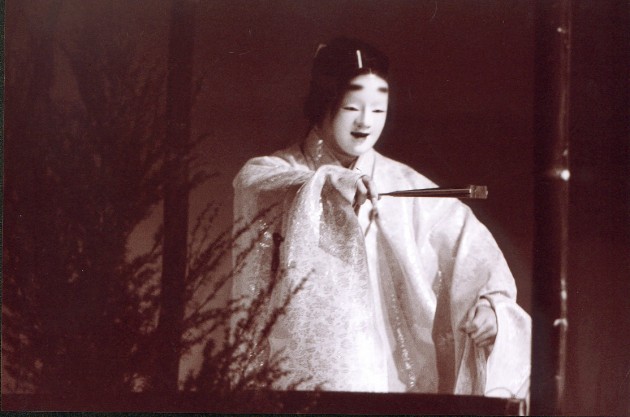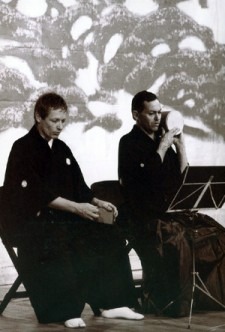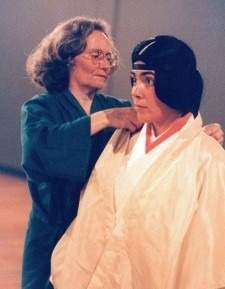
Katherine Mansfield was born in Wellington and spent her childhood there. Her parents, grandmother, three sisters, one brother, an aunt and various servants lived in the same household. She had ambivalent feelings for her father all her life. She was sent to London for a couple of years to finish her education. When she came home, she could not tolerate the provincial simplicity of life in New Zealand. So she left New Zealand at the age of 19, never to return.
Twenty-four tempestuous years in England and France followed. She married John Middleton Murry, and mixed with intellectuals and writers including Virginia Woolf, Bertrand Russell, Clive Bell, Aldous Huxley, T S Eliot and D H and Freida Lawrence. Her short stories quickly made her famous.
At the age of 35, terminally ill with TB, she joined the commune of spiritual leader Gurdjieff in Fontainebleau, France. There, about 50 people, mostly Russians, lived together in a rustic community, sharing practical, earthy tasks. Katherine Mansfield lived joyfully with Gurdjieff and his followers until her death a few months later.

Waki Sir Harold Beauchamp (Katherine Mansfield’s father)
Shite [PART I] a woman member of the Gurdjieff community
Nochi-jite [PART II] the ghost of Katherine Mansfield
Kyogen an elderly member of the Gurdjieff community
In the grounds of the Gurdjieff Institute in Fontainebleau.
[WAKI ENTERS]
WAKI
It is January the ninth.
The stars are a sheet of ice across the sky.
The fields are brown and cut to the quick.
The trees are bare.
Dead leaves shuffle over bare soil.
The earth is cold to its very core.
They say this is normal, here—
but it doesn’t seem normal to me.
In the southern hemisphere
holiday and sunshine start the year.
In winter, trees don’t lose their leaves.
At New Year, all resolve
to turn a new leaf, and mend our lives.
I am Sir Harold Beauchamp from New Zealand. I am Chairman of the Bank of New Zealand. I have travelled twelve thousand miles to see this place, the Gurdjieff Institute in Fontainebleau, near Paris. My daughter died here, many years ago.
This is the second sad pilgrimage I have made to France. My son died here in the Great War, and I came to see his grave. Seven years later, on this very day, in this very place, my daughter Katherine died of tuberculosis. It is a long journey from Wellington to Fontainebleau. Again I have travelled as far as a person can travel without starting back towards home. The world is round. You can travel far from home. Then you reach a point where you must stop, or else you are on the way back home again.
It is bitter when a daughter dies before her father.
It is bitter to stand by a daughter’s grave.
Katherine was only thirty-five.
This morning I reached the community where she died,
the Gurdjieff Institute.
I did not tell them who I was. I was too ashamed.
Today they kindly gave me a tour.
I have seen the room where she died.
This Institute has stables and pigpens and barns,
a dormitory, a hall, and a holy space.
Everything is crude and plain.
Bare boards, red rugs, thick drapes.
How sad to think my daughter died
so far from home, in such a strange and simple place.
The leaves move in the garden.
The sky is pale.
It is cold, very cold.
But I cannot bear to leave this place.
This was her reality.
I will sleep tonight in the cowshed.
It’s a way of feeling close
to Katherine Mansfield.
[SHITE ENTERS IN THE GUISE OF A SIMPLE WOMAN COME TO CHECK ON THE COWS.]
SHITE
On a cold winter night it is good
to be with animals,
warm cows that willingly give
their sweet frothy milk.
On a cold winter night it is good
to breathe the breath of cows,
to live with a group of people
who are busy and kind.
I remember a warmer place,
my place in the sun,
my Paradise lost
in the South.
At New Year we went swimming
in the clear blue sea.
A little girl at home
with people,
warm and quick and kind.
I was never alone for long.
CHORUS
She was never alone for long.
People and cows and dogs and sheep
can make a cold place warm.
She was never alone for long.
WAKI
I wonder who this woman is. I don’t remember seeing her today at the Institute. Is she here to milk the cows? Surely it is too late at night for that?
[SHITE STROKES A COW]
SHITE
Daisy, you are my favourite cow. I love your big brown eyes, your twisty horns, your brown coat, your white eyelashes, your vigorous tongue! You remind me of my home.
WAKI
Excuse me! May I talk with you a moment?
SHITE
You startled me. Why are you here in the cowshed?
WAKI
I am a visitor at the Gurdjieff Institute. They told me I could sleep here tonight. I met many people today.
SHITE
What joy it is to be with living people
who are workers all together,
strange and quick and not ashamed to be themselves!
WAKI
I don’t believe we’ve met. Are you a member of the Gurdjieff community?
SHITE
Long ago, I lived here. It is a kindly place. Why have you come?
WAKI
I am on a pilgrimage, for here my daughter died,
and her grave is close.
When I think about her tragic death I feel emotional.
We had many foolish misunderstandings.
I’m a happy man, but still there’s something wrong.
I wish that I could tell her I am sorry.
SHITE
If you are troubled, it is good you are here. This is a holy place, a healing place. Who are you, and who was your daughter?
WAKI
I am here incognito. I’m proud of who I am; yet here, where she died, I’m ashamed to say my name.
SHITE
No one can help you if you won’t admit your name.
WAKI
To you I’ll say my name. For truly, I feel no better for my pilgrimage. Indeed, I feel worse. Perhaps it will relieve me to open my heart to a stranger. I am Sir Harold Beauchamp, father of Katherine Mansfield.
SHITE
Father of Katherine Mansfield, the famous writer who died here years ago?
WAKI
Did you know my daughter? If so, please tell me about the last days of her life. I have not dared to ask the other people.
SHITE
Indeed, I knew her slightly.
Her words are always in my mind.
WAKI
Please tell me what she said in the months before she died!
CHORUS
I wish it were not so cold.
The taste of blood in my mouth is strange.
Last night I felt my body breaking up like glass.
How easy it is to die.
I’m a dead woman even now.
Can I walk? I can only creep.
I am a parasite, a cripple.
That is what she said in the months before she died.
WAKI
My poor daughter! My poor daughter!
Such a dreadful way to die!
SHITE
My spring of life is starved, she said.
I want a home! I want a real life.
I’m a woman, not a girl.
All this love and joy that fights
for outlet, all this life
that’s drying up like milk in an old
breast. Oh I want life.
CHORUS
She wanted life, she wanted life,
she wanted to be real!
SHITE
I dream of New Zealand again and again
I dream it is delightful,
and there is no escape.
I want a home. I want some friends
and people and a house.
If I were allowed a single cry to God
it would be,
‘I want to be real.’
CHORUS
She wanted life, she wanted life!
She wanted to be real!
SHITE
Fire is sunlight,
fire returns
to the sun
in a cycle.
Everything
has its shadow.
The leaves move
in the garden.
The sky is pale,
and I catch myself weeping.
It is hard, oh it is hard
to make a good death.
CHORUS
It is hard, oh it is hard
to make a good death.
WAKI
Do not leave me with these dreadful words!
Tell me something good before you go!
Did she ever speak about her family?
Did she speak sweetly of New Zealand?
CHORUS
Again and again
she dreamed about New Zealand.
New Zealand and her family filled her mind.
Her dear little mother, her jovial father,
her sisters and cousins and uncles and aunts,
the dogs and ducks and cabbages
and cows of dear Karori —
these were always on her mind.
WAKI
Tell me a happy memory of my daughter’s
or I fear I’ll never go to sleep.
[SHITE DANCES MINIMALLY]
SHITE
She spoke about her birthday ball,
dancing with handsome partners
on a beautiful golden floor.
CHORUS
Round and round and round she danced.
How heavenly! The coloured flags,
the gleaming floor, the pink and white
azaleas, the golden chairs,
the lanterns — round and round and round —
how heavenly, how heavenly!
SHITE
But then a fat man made this young girl
want to run away and cry.
He said one day she would be old,
old, old, in an ugly dress,
and no-one would want to kiss her
any more. She wanted
happiness to last forever.
Things can change so quickly!
CHORUS
She wanted to leave the ball and be at home.
The moment you leave home,
you start a journey that
will lead you home again.
Beautiful things can vanish overnight.
The first ball is the beginning of the last.
WAKI
There is something very strange here. You know too much about my daughter and New Zealand. Who are you? Please tell me your name!
[SHITE LEAVES THE STAGE]

[KYOGEN, A MAN OF THE GURDJIEFF INSTITUTE, ENTERS]
KYOGEN
Are you comfortable in here? Is there anything you want before you go to bed?
WAKI
Well, I do have a question I’d like to ask, if you don’t mind.
KYOGEN
All right. What do you want to know?
WAKI
I am very curious about Katherine Mansfield, who died in this place. Were you here at that time? If so, please tell me everything you know.
KYOGEN
Well, now, yes, I knew her. I’ve been a member of the Gurdjieff Institute right from the start. Since you’ve asked me, I’ll tell you the little I know. Katherine Mansfield was a famous young writer from New Zealand. She came to Europe to make her name. At first she wrote smart little stories about Germany, and they quickly became a success. But then her young brother Leslie was killed in the war. That changed her forever. She had made him a promise, you see. They used to reminisce about their childhood — ‘Remember this? remember that?’ Anyway, her brother made her promise to write about New Zealand. When he died, she was devastated. They were very close. But she remembered her promise, and she started to write many stories about their happy childhood in New Zealand. Those stories were different. They were still very witty, but they were loving stories, because they were written for her brother.
Well, she wrote and wrote and wrote. It was her mission in life, you see. But the problem was, she had tuberculosis. She got sicker and sicker, and by the time she was 30, she knew she was going to die. She was always moving, looking for somewhere healthier. England was no good of course. Terrible climate in England. She tried the South of France, for the sunshine. No good. She tried the Swiss Alps, for the mountain air. No good, she just got sicker and sicker. So she kept on moving, and she never had a proper home in all those years.
WAKI
But what about her husband? She was married, wasn’t she?
KYOGEN
From what she said, her husband was a funny one. You see, Katherine Mansfield loved gardens and animals and people — she loved them! Dogs and cows and flowers — she loved them all. But her husband, all he loved was books. He wouldn’t notice a flower if it jumped up and bit him! He wouldn’t know a cow if it squirted milk straight in his eye!
WAKI
Why did she marry him, then? He sounds rather boring, and selfish too. Or so I’ve heard.
KYOGEN
Oh, well, Katherine Mansfield loved to talk about books! I think for years and years her life was books books books, talk talk talk, think think think, and nothing else. All in the head. So when she knew she was dying, she wanted to change her life. She knew her life had become unreal. So she came here to the Gurdjieff Institute. And Gurdjieff, the holy man, he said to her, ‘Look, stop all this thinking! Just live in your body for a change.’ Well, it was a sick little body by then, but she did her best. She loved to watch us dancing, and she’d shake the tambourine. We do a lot of dancing here, you know.
We grow vegetables and breed animals and build buildings, and we also do a lot of singing and dancing. Gurdjieff said it balances your life. He was a sensible man. He built these buildings with his own hands. We all helped, but he designed them. A practical man.
WAKI
Pardon me for saying this, but you seem to lead a pretty primitive life here, and it’s jolly cold! Some people say that it killed Katherine Mansfield. Is it true that she had to peel carrots and chop up onions?
KYOGEN
Of course! She wasn’t much use, mind you. She was dying, you see. But she helped with the vegetables and patched the odd pair of trousers for some of the men.
WAKI
She must have hated that! She hated all domestic things. She woudn’t even mend a stocking! She refused! She had her mind on higher things. Or so I’m told.
KYOGEN
Are we talking about the same Katherine Mansfield? Our Katherine Mansfield loved to sit in the kitchen while the pots were banging and the cooks were all shouting and laughing.
WAKI
There’s something else that puzzles me. You’ve got fifty people living all together in this Institute! But Katherine left New Zealand to get away from people. She wanted privacy. She only liked clever people like Virginia Woolf or D.H Lawrence. She didn’t like the company of ordinary people. So they say.
KYOGEN
No no, we must be talking about two different people. Our Katherine Mansfield was just the opposite. She loved to be with a crowd of people in the kitchen or the cowshed or the dancing hall. Loved it!
WAKI
I think she must have been very unhappy here. And it’s all her father’s fault.
KYOGEN
How can you say that? She loved it here! She couldn’t stop smiling. She even died with a smile on her face. She knew exactly what she needed, and she came here and she got it. A home, a family, and a few cows. Anyway, what’s it got to do with her father?
WAKI
Well, surely her father could have rescued her! He was wealthy enough. But he just didn’t understand how ill she was. Or how proud she was. Maybe he gave her a little money, but maybe he thought that was her husband’s duty.
KYOGEN
Well, never mind that. Nobody could cure tuberculosis. But Gurdjieff healed her spirit, and that was wonderful. That’s what everybody here says, and I’m sure it’s true. Anyway, why are you so interested in Katherine Mansfield? She’s been dead for a long time now.
WAKI
To tell the truth, I have just had a strange encounter with a woman here in the cowshed. She would not tell me her name.
KYOGEN
I don’t believe I know your name, sir, either.
WAKI
Well, never mind that. But who was this woman? She came to see the cows, and stayed to speak of Katherine Mansfield.
KYOGEN
Well, that is very strange, because Katherine Mansfield used to love sitting in here with the cows. She loved to drink their milk while it was still warm and frothy. This cowshed often feels rather strange at this time of year, near the anniversary of her death. I say! I wonder whether that woman was the ghost of Katherine Mansfield? And if so, why did she speak to you?
WAKI
I don’t know. I can’t imagine why. It is very disturbing. I’ll try to sleep now. Thank you for your kind help. Goodnight.
KYOGEN
If there’s anything else you want, just shout. I’ll see you in the morning.
[KYOGEN LEAVES]
WAKI
The stars stab like icicles through that mean little window.
This wooden shed is warmed only by the bodies and the breath of cows.
On this bed are rough wool covers. I hate to think of my delicate daughter living here!
The girl who loved silks and velvets, sitting with cows in the hay!
The girl who frightened us all with her brain, peeling carrots and patching trousers!
I cannot believe she was happy here, no matter what that old man says.

[SHITE ENTERS AS THE GHOST OF KATHERINE MANSFIELD]
SHITE
The stars froth over the heavens
like fresh, warm milk!
They burst into the heavens
like daisies in the summer grass,
or tiny white manuka buds!
The stars waltz over the sky in white lace gowns!
The earth is beautiful, and hard to leave.
WAKI
Ah, you are back! I beg you, tell me who you are!
I am afraid to ask — are you the ghost of Katherine Mansfield?
Are you my daughter whom I loved?
She never thought I loved her,
but I loved her.
SHITE
I am your daughter Katherine.
WAKI
I’m very bad at saying how I feel.
It always comes out wrong.
But Katherine, ghost of Katherine,
please forgive my clumsiness,
my many errors as a father!
If you cannot forgive me now,
that will be hard for me to bear.
SHITE
Father, there is nothing to forgive
except my own dependence.
I always asked too much from you.
I wanted such a proof of love
that nobody could give.
WAKI
Why did you leave your home in anger?
Did you not love your family?
SHITE
I did not know I loved you.
Firmly attached,
I loved you far too much.
WAKI
You told us years ago,
‘I do not value love.
I value independence.’
So I gave you independence.
That was the gift I thought you needed most.
SHITE
Father, I was young
and it was true at the time.
But later I paid dearly
for my precious independence.
WAKI
An old man told me you were happy here.
But how could that be so?
SHITE
Here I was happy. Here in this cowshed,
this kitchen, this garden,
this dancing hall — yes, here I was happy.
WAKI
But why spend your final days
in such a plain and rural place?
CHORUS
Do you remember New Zealand, Father?
The pine trees, the harbour, the gardens,
the wind and the sun?
Do you remember the fresh smell of milk,
and the flowering grass in the orchard?
Do you remember the family fun?
Do you remember the people, the talk,
the quarrels, the gossip, the games?
SHITE
For years I lived alone
with a paper husband in a book.
I stopped growing.
I was dying of the poverty of life!
I was tired of my poor little stories
bred like birds in a cage.
I felt like a little girl locked
in a sombre cupboard,
forgotten, afraid, alone in the dark.
I wanted one more time before I died
to touch the things I loved:
the earth and its wonders, the sea, the sun,
the flowers, and the cows.
With all my soul I longed
for warm, eager, real life,
for truth, and strength.
I wanted to be real!
CHORUS
When she found she had to die
she wanted to be in a family
with plants and aunts and animals
and a father just like you.
She couldn’t go back, for she was ill.
But she found her lost New Zealand
here, and called it home.
WAKI
This makes me feel much calmer.
I think I understand.
But why does your spirit linger here?
Have you atoned for your sins?
SHITE
Oh I repent my sins.
Before my brother died I was unfaithful,
I was false to everyone —
my country, my lovers, my family, you.
I promised my brother I would write
about that lovely time
when we were both alive.
I have performed my duty
to him and to New Zealand.
I have paid my debt of love.
WAKI
Then why do you linger here on earth?
SHITE
The leaves move in the garden.
The sky is pale
and everything has its shadow.
It is hard, oh it is hard
to make a good death.
I have learnt again those loving lessons
of family, simplicity, community.
Now I have seen you once more,
I can slide away.
WAKI
Don’t leave me here alone!
Stay with me a while, a little while!
SHITE
Father, listen, this I know.
The earth is real enough to love.
The more we love, the more we must
let be, let go.
I must not linger here below.
I must let go the things I love,
the ones I love, I must let go.
SHITE
Oh it is hard, my father,
to find a new way of life.
All my mistakes I have made out of fear.
With Gurdjieff the holy man
I lost my fear of the void,
but still I love the earth so much
it’s hard to trust, and let it go.
CHORUS
Dead leaves shuffle over bare soil.
But winter does not last forever.
Like little girls who turn a skipping rope,
joy and sorrow, fear and hope
must take their turns.
The very sun and moon take turns
to shine upon the soil.
Europe has the winter while
New Zealand has the summer.
SHITE
Let us be tender, let us be loyal,
let us be kind and rejoice in each other,
for everything has its shadow.
[SHITE BEGINS HER DANCE OF CELEBRATION & FAREWELL]
CHORUS
She wanted to be at home,
but presently began
a soft tune, a melting tune, a ravishing tune.
She walks on to that golden floor.
In one minute, in one turn,
she forgets the cruel man.
Her feet are gliding, she is floating
over the beautiful slippery floor.
The night is solemn no more.
It is dazzling and golden and bright.
All becomes one beautiful flying wheel.
She is scattered, she is spinning,
floating on a wave of music.
The moment we leave home
we start upon a journey
that leads us home again.
The night is solemn no more.
It is dazzling and golden and bright.
It is dazzling and golden and bright.
